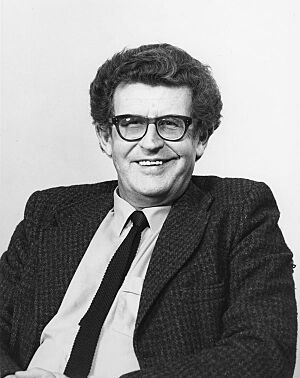Kenneth Minogue facts for kids
Quick facts for kids
Kenneth Minogue
|
|
|---|---|

Minogue, c. 1980s
|
|
| Born |
Kenneth Robert Minogue
11 September 1930 Palmerston North, New Zealand
|
| Died | 28 June 2013 (aged 82) |
| Other names | Ken Minogue |
| Alma mater | |
| Spouse(s) |
|
| Scientific career | |
| Institutions | London School of Economics |
| Influences | John Anderson |
Kenneth Robert Minogue (born September 11, 1930 – died June 28, 2013), also known as Ken Minogue, was an Australian expert in political science. He spent most of his life in the United Kingdom. Minogue was a key thinker in British conservatism, which is a type of political belief.
He worked for many years at the London School of Economics (LSE). From 1984 to 1995, he was a Professor of Political Science there. He was seen as an important person among other conservative thinkers at the LSE. These included people like Maurice Cranston and Elie Kedourie.
Contents
About Kenneth Minogue
Early Life and Education
Kenneth Minogue was born in Palmerston North, New Zealand, on September 11, 1930. He grew up and went to school in Australia. He attended Sydney Boys High School and later the University of Sydney. In 1950, he earned a Bachelor of Arts degree.
At university, he was influenced by John Anderson. Anderson was known for strongly believing in free speech, secularism (keeping government separate from religion), and being against communism. Minogue also wrote for student newspapers, like Honi Soit.
Moving to England
Minogue decided to move to England. He worked as a cabin boy on a ship to get there. The ship sailed to London through places like Odessa and Port Said. Once in London, he lived in a hostel.
He worked as a freelance writer for a short time. Then, he became a supply teacher for about 18 months. He wanted to study for a master's degree at the LSE but was not accepted. Instead, he took another undergraduate course in economics at the same school.
After graduating, he taught at the University of Exeter for a year. In 1956, he returned to the LSE as an assistant lecturer. He stayed at the LSE for the rest of his teaching career.
Minogue's Work and Ideas
Kenneth Minogue wrote many academic essays and books. These books explored different ideas in political theory.
Key Books and Criticisms
He became well-known after his 1963 book, The Liberal Mind, was published. In this book, he criticized how Britain was moving towards collectivism after World War II. Collectivism is when society focuses on the group rather than individuals. He believed this trend made people less likely to take their own initiative.
Minogue also disliked what he called the 'melodrama of oppressors and victims'. He saw this as a common way that liberal history was told. He thought that liberalism was the first 'modern ideology'. An ideology is a set of beliefs that guides a person or group.
He also wrote about nationalism in his 1967 book. Nationalism is a strong feeling of pride in one's country. Minogue believed that while liberal history sometimes ignored the past, nationalist ideas often turned history into mythology (stories that are not always true).
Other Contributions
In 1986, Minogue hosted a six-part TV show on Channel 4. The show was about free-market economics, which is an economic system with little government control. It was called The New Enlightenment.
He was also a Senior Research Fellow at the Social Affairs Unit in London. In 1998, he wrote a study about the relationship between Māori and Pākehā (New Zealanders of European descent). This study was published as Waitangi - Morality and Reality.
From 1991 to 1993, Minogue was the chairman of the euro-sceptic Bruges Group. This group was critical of the European Union. From 2000, he was a trustee for Civitas, which is a research organization. He also served as president of the Mont Pelerin Society starting in 2010. This is a group that promotes free markets and open societies.
In 2003, the Australian government gave him the Centenary Medal. He was also involved with the Centre for Policy Studies and the European Foundation.
Personal Life
Kenneth Minogue married Valerie Pearson Hallett in 1954. They had a son and a daughter. Their marriage ended in 2001. Later, Minogue married Beverly Cohen, who passed away before him. He was also a big fan of tennis.
Death
Kenneth Minogue passed away on June 28, 2013, at the age of 82. He died in Guayaquil, Ecuador. He had been hosting a meeting of the Mont Pelerin Society in the Galapagos. He reportedly suffered a cardiac arrest (a sudden stop of the heart) on his flight back.
Many people remembered Minogue for his work. James Philbin wrote that Minogue was not just an academic. He was a "model of the conservative activist" who defended "old-fashioned civility against ideological rage." He believed this was the true meaning of freedom.
See also
 In Spanish: Kenneth Minogue para niños
In Spanish: Kenneth Minogue para niños
 | Janet Taylor Pickett |
 | Synthia Saint James |
 | Howardena Pindell |
 | Faith Ringgold |

